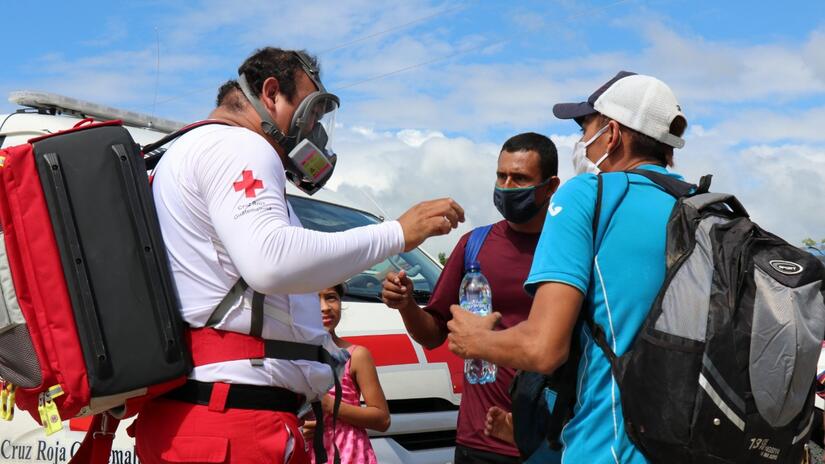Geneva, 17 December 2020 – The President of the world’s largest humanitarian organisation warns that inclusive action is urgently needed to safeguard the health and dignity of migrants worldwide, and to ensure they are not left behind as the first COVID-19 vaccines start being distributed.
Speaking ahead of International Migrants Day tomorrow, the President of the International Federation of Red Cross and Red Crescent Societies (IFRC), Francesco Rocca, said: “As the first COVID-19 vaccines begin to roll out, migrants – irrespective of their status – must not be left at the back of the queue. The pandemic is having a catastrophic impact on people on the move, who are too often left to fall through the cracks when it comes to accessing essential health services. It is imperative that we address the many barriers to universal health coverage and that migrants are fully included in national vaccination campaigns.”
A recent IFRC report “Least Protected, Most Affected: Migrants and refugees facing extraordinary risks during the COVID-19 pandemic” revealed that migrants have been disproportionately exposed to, and affected by, the virus this year due to often limited access to essential health, water, sanitation and hygiene services, as well as poor and unsafe living and working conditions that make it harder to comply with basic preventative measures. It also showed that migrants are being hit hardest by the economic fallout of COVID-19, are widely neglected from formal protection and safeguarding measures, and regularly face stigma and discrimination – sometimes in the form of violence.
As countries begin their vaccination campaigns, migrants are at massive risk of being excluded yet again. And the inequitable distribution of vaccines between and within countries not only threatens to leave the most marginalised behind but also risks undermining our shared health if the virus is left to continue unabated within unprotected communities.
“For many months now, IFRC has called for a people’s vaccine that is delivered based on our shared humanity and commitment to defeat this pandemic by protecting the most vulnerable in society first. None of us will be safe until we are all safe. When future generations read about this pandemic in the history books, let them be proud that the world treated migrants, refugees and asylum seekers with dignity rather than ashamed that we turned our backs in this hour of greatest need,” added Mr Rocca.
Since the start of the pandemic, National Red Cross and Red Crescent Societies worldwide, supported by the IFRC, have stepped up their support to migrants, refugees and asylum seekers in response to devastating impacts on lives and livelihoods:
- In Turkey, household debts among refugees have doubled and more than 80 per cent of respondents to a recent IFRC and Turkish Red Crescent study reported a member of their family becoming unemployed due to the pandemic. Through the Emergency Social Safety Net (ESSN), funded by the European Union and implemented by the Turkish Red Crescent and IFRC, 1.8 million refugees receive cash assistance every month to help cover their essential needs such as rent, transport, bills, food and medicine. Additional financial support was provided from June to July to help people cope through particularly tough months.
- In early October, a migrant caravan of over 2,300 people crossed from Honduras into Guatemala. The Guatemalan and Honduran Red Cross Societies provided assistance and care to hundreds of migrants on both sides of the border. For arriving migrants, the Guatemalan Red Cross volunteers provided a range of services including pre-hospital care, water, hygiene items, snacks, face masks, and accessible information on COVID-19 prevention.
- Since early November, fighting in Northern Ethiopia has caused at least 40,000 people to flee into neighbouring Sudan. Arriving refugees are being accommodated in temporary shelters at transit centres, where the Sudanese Red Crescent Society is working alongside the State Ministry of Health to provide healthcare and emergency assistance. Together they have rehabilitated two clinics and are conducting health and nutrition screenings, medical consultations, and referrals. Red Crescent teams have provided soap, mosquito nets, sleeping mats, blankets and biscuits to those arriving. An additional truckload of non-food emergency items for 500 families has been dispatched.
- In Greece, following a fire that destroyed Moria camp on Lesvos and prompted almost 11,000 refugees to flee, the Hellenic Red Cross has been providing vital health services, accommodation, essential items, psychosocial support and legal aid to people relocated to the new camp at Kara Tepe. Conditions in Kara Tepe fall short of international humanitarian standards, with sanitation and hygiene the main concern and tented accommodation not yet fully winterised.

